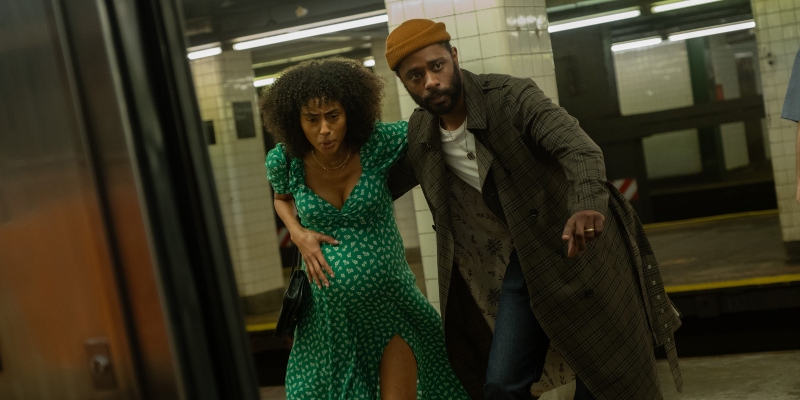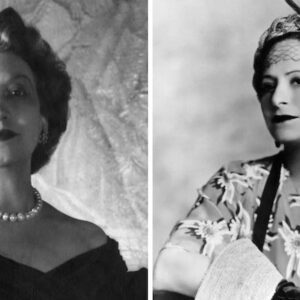The Changeling Brings a Genre-Bending Fable of Family to the Screen
Rebecca Ackermann on the New Series Adaptation of Victor LaValle’s Literary Horror Novel
Victor LaValle’s 2017 literary horror novel, The Changeling, contains another book at its center: Maurice Sendak’s children’s tale Outside Over There. In Sendak’s story, goblins steal a neglected baby while “Papa is away at sea,” replacing her with a child made of ice. In LaValle’s novel, rare bookseller Apollo Kagwa has an obsession with the Sendak book and the drive to become the perfect parent in the place where his own father should be. Apollo is a “New Dad,” as LaValle calls the collection of modern men snapping photos of their kids, wearing babies to the park, and changing the fatherhood narrative for the next generation. New Dads believe they’ve discovered a foolproof recipe for safety: commit to the role, charge ahead, and never look away. (“I just want to be a good father,” Apollo tells his future wife, Emma, on their first date.) But LaValle’s novel—and now the Apple TV+’s new series based on the book and co-produced by the author—issue a warning for such well-meaning hubris. When Emma tells Apollo their own baby has been swapped, he can’t see the truth for all his looking.
In the hands of showrunner Kelly Marcel (who wrote Fifty Shades of Gray and Venom), The Changeling sharpens and expands the themes of parenthood and generational trauma in its move from page to screen. The book focuses on Apollo’s perspective, a boy who grows into a man by relying on his own confidence (“I am the god Apollo” he tells himself when faced with a challenge). But the TV series opens up the frame to include Emma’s story too, portrayed by a captivating Clark Backo. We watch her struggle in the early postpartum days, and we see how that struggle turns to torture when Emma can’t shake the sense that her baby is not her baby anymore. But Apollo, played brilliantly by LaKeith Stanfield, doesn’t share our perspective. Frustrated with her unshakable negativity, he tells Emma to go take another pill.
The series also details the complex experiences of Apollo’s mother, Lillian—a moving turn by American Horror Story veteran Adina Porter—who navigated single motherhood as a Black immigrant woman in New York City and never mistook the world for a safe place. Apollo berates his mother for pushing his father away, and names his son after the absent man. The reality is more complicated, but he rejects her attempts to dispel his cherished fantasy. “I don’t want to hear your stories,” Apollo yells at her. “Your stories are all sad.” Apollo’s aspirations for omniscient fatherhood prevent him from seeing his real mother, too.
When Emma tells Apollo their own baby has been swapped, he can’t see the truth for all his looking.All three perspectives weave together as the series moves organically between past and present. Lillian leaves a young Apollo at home alone while she works weekends, and Apollo returns home with his son in the next shot. Emma sets out in search of her child, and the next moment Apollo arrives to look for her—months later. Geography works this way too; a magical island of mothers and children floats just beyond Rikers. Time and space form an emotional landscape in The Changeling, and traversing it requires each character to delve into the traumas and joys that brought them to their current moment. For Apollo Kagwa and his family, there can be no moving forward without first re-examining the past.
In the new series, color reveals new layers of meaning the way only a visual medium allows. Apollo’s knowable version of New York hums in sumptuous browns and greens. He moves between boroughs and cultures that all feel apiece, warm, and comfortable. Blue enters only in his recurring childhood nightmares and the blue light cast by screens, where online trolls drive Emma to the edge and stalk the baby through Apollo’s proud photos. When Emma finally proves to Apollo that security was a fantasy all along, she wields a kettle heated to boiling on a blue flame before committing an unthinkable—but necessary—violence to set them back on the right path. Red is another mysterious warning that only the women possess: Emma wears an enchanted bracelet and Lillian remembers an ominous suitcase, pinned to the bottom of the East River by a heavy secret.
The threatening role of whiteness is more evident in the series than in the novel as well. Apollo, Emma, and their closest friends are Black, with white folks appearing only on the margins. (A childless white woman chides Apollo for wearing his baby wrong before being swiftly dispatched by the wit of Apollo’s best friend, Patrice.) But Apollo’s father is white, and he roars back into Apollo’s nightmares once the baby is gone. Another untrustworthy white man soon appears who is not who he claims to be. And the source of the dangerous creature that has taken Apollo and Emma’s child is traced back to Scandinavia and an eerie Midsommer-like ritual.
All the people are white in Sendak’s Outside Over There too, their skin nearly the color of paper, and the goblins are shrouded black voids. Perhaps that’s why the TV adaptation smartly swaps out the book at the center of the novel for a fictional version with less racially defined (and questionably coded) characters. But the new book contains another key change: it’s not neglect that puts the baby in danger, it’s the fantasy of the perfect family. “Babies are a dream made real,” the book intones, “but dreams are fairies’ favorite meal.” No matter how vigilant, Apollo has been vulnerable from the start—as all new parents are. But he can’t see that until Emma takes a brave first step for them both.
Of course, Apollo is not the first parent to hold on tight and still lose a child through the cracks. In both the novel and the TV series, LaValle’s The Changeling spins an unconventional and enthralling narrative that spans generations and genres. But the real story at its center is far older and simpler than New Dads or absent dads or any parent in between. “The new fears are the old fears,” the leader of that magical island explains to Apollo. “The old fears are ancient, but when it’s our turn to face them, they’re made new.” Apollo has to lose his baby to finally understand what all parents must learn, no matter how competent or careful: family is not an adventure to embark on alone.




















